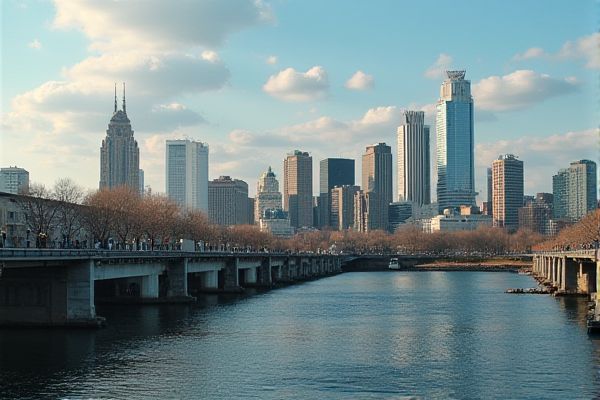
Insights from Michigan residents and expatriate communities: Harsh winters with heavy snowfall. Diverse cultural and food scene. Great lakes offer outdoor activities. Thriving automotive and tech industries. Friendly and welcoming communities. Affordable housing options available. Public transport limited in some areas. Seasonal allergies are common. Sports culture is very strong. Education systems vary by district.
Harsh winters with heavy snowfall.
Michigan residents and expatriate communities must prepare for harsh winters with significant snowfall, temperatures that can feel much colder due to windchill, and the need to dress in layers and take precautions for safe transportation and outdoor activities. For more detailed information and helpful resources on how to best prepare and adapt to these conditions, you can visit the International Center at the University of Michigan. Proper preparation is crucial to ensure safety and comfort during the challenging winter months.
Diverse cultural and food scene.
Michigan's diverse cultural and food scene is highlighted by its vibrant communities representing various cultures, offering a wide range of ethnic cuisines such as Lebanese, Mexican, Indian, Korean, and more. Alongside these global flavors, the state boasts iconic regional dishes like Coney Dogs, Pasties, and Detroit-Style Pizza. For those eager to dive deeper into this culinary tapestry, Michigan's Culinary Delights provides a comprehensive exploration of what makes the state's food scene so uniquely appetizing. Whether you are a seasoned foodie or a curious traveller, Michigan offers a gastronomic journey like no other.
Great lakes offer outdoor activities.
Michigan residents and visitors alike enjoy a wide range of outdoor activities provided by the Great Lakes, including fishing, boating, swimming, sailing, and even scuba diving to explore shipwrecks, highlighting the lakes' significant role in the state's economy, culture, and recreational opportunities. For more insights into these activities and how they shape Michigan's unique local culture, consider exploring Exploring the Great Lakes State: A Guide to Understanding the Locals.
Thriving automotive and tech industries.
Michigan residents and expatriate communities benefit from a thriving automotive and tech industry, with the state leading in vehicle production, electric vehicle investments, and automotive R&D. It hosts major initiatives like Ford's Michigan Central Innovation District and Stellantis's expanded User Experience and Design Groups. For more details, explore the initiatives through the Michigan Central Innovation District, which exemplifies the state's commitment to automotive advancement and mobility innovation.
Friendly and welcoming communities.
Welcoming Michigan works to build inclusive and welcoming communities across the state by partnering with local governments and community leaders to ensure immigrants and newcomers feel valued and can fully participate in their communities. This initiative fosters mutual respect and a sense of belonging among all residents. To learn more about their efforts, visit the Global Detroit website.
Affordable housing options available.
In Michigan, there is a significant shortage of affordable rental homes for extremely low-income households, with a notable disparity between the demand and availability of affordable housing options. With the state classifying 299,020 renter households as extremely low income, there is an astonishing shortage of 188,895 affordable rental homes. Many of these households face severe cost burdens, spending over half of their income on housing. To combat this issue, Michigan is investing $250 million to support the construction of new affordable housing units. This initiative will roll out projects across various areas, including Detroit, providing housing with preferences for households using tenant-based rental assistance. Additionally, the Michigan Statewide Housing Plan sets an ambitious goal to build and rehabilitate at least 75,000 housing units, with over half dedicated as affordable, while also addressing systemic barriers faced by immigrant and refugee communities in accessing housing and mortgage financing. These comprehensive efforts will help create both temporary and permanent jobs, highlighting the state’s commitment to improving housing accessibility for its diverse population.
Public transport limited in some areas.
Public transportation in Michigan is limited, particularly in rural areas and small towns, due to a shortage of drivers, limited routes and hours of service, traffic, construction, and affordability issues, which significantly hinder Employment Opportunities for residents.
Seasonal allergies are common.
In Michigan, seasonal allergies are common and typically start in early March, peaking in May, June, and September due to tree, grass, and weed pollen, with indoor allergens like dust, pet dander, and mold causing issues during the winter months. Climate change has extended the pollen production season, making allergies more severe and longer-lasting. For more information, you can visit Wyndly to learn about managing these challenges effectively.
Sports culture is very strong.
Sports culture in Michigan is exceptionally strong, driven by rich traditions, intense rivalries, and the success of programs like the University of Michigan and Michigan State University. At the heart of this enthusiasm is the electric atmosphere of Michigan Stadium, where beloved rituals such as the "Go Blue" banner and singing "The Victors" after touchdowns have become timeless. The passion for college football in Michigan is unparalleled, making it a defining feature of the state's cultural identity. To explore more about this phenomenon, visit College Net Worth for a deeper understanding of why college football holds such remarkable popularity in Michigan.
Education systems vary by district.
Michigan's education system is marked by significant disparities between districts, with high-performing schools receiving considerably more funding per student than lower-performing ones. This discrepancy is largely attributed to differences in state and local funding, often tied to housing taxes and local property values. These funding inequalities are highlighted in a recent analysis on the Michigan's Two-Tier Education System, which underscores the challenges and calls for reforms to bridge the educational gap and promote equitable opportunities across all districts.
